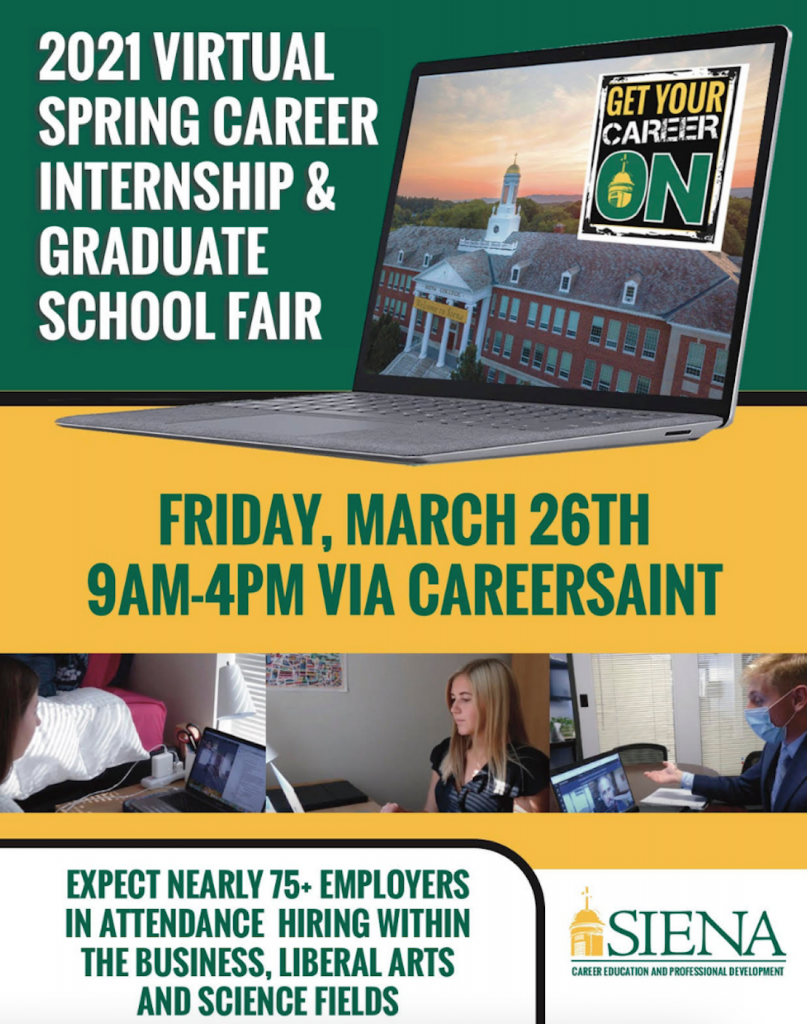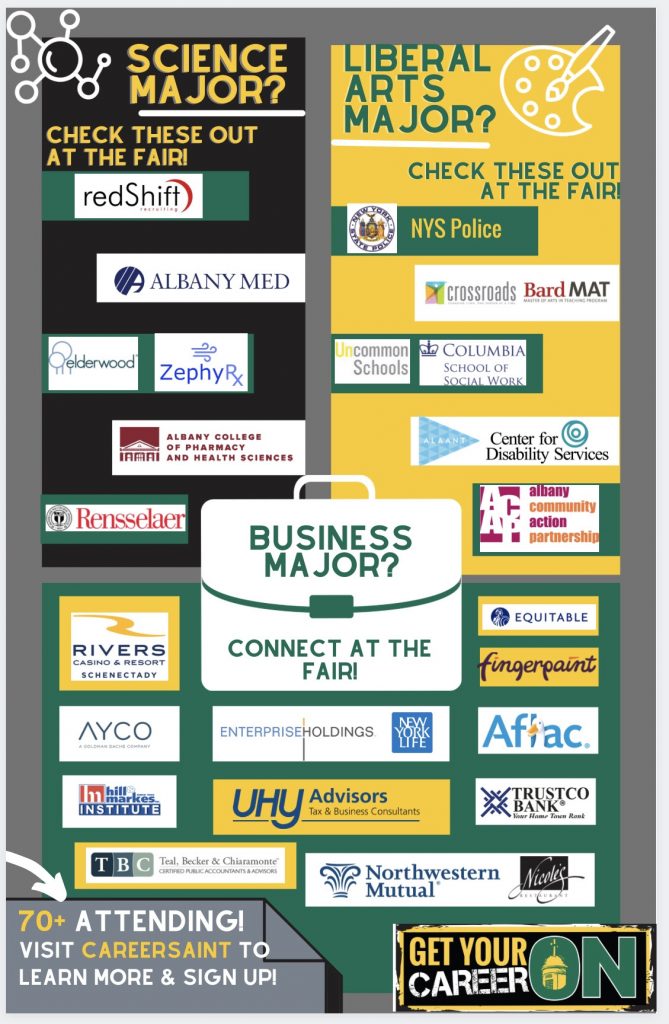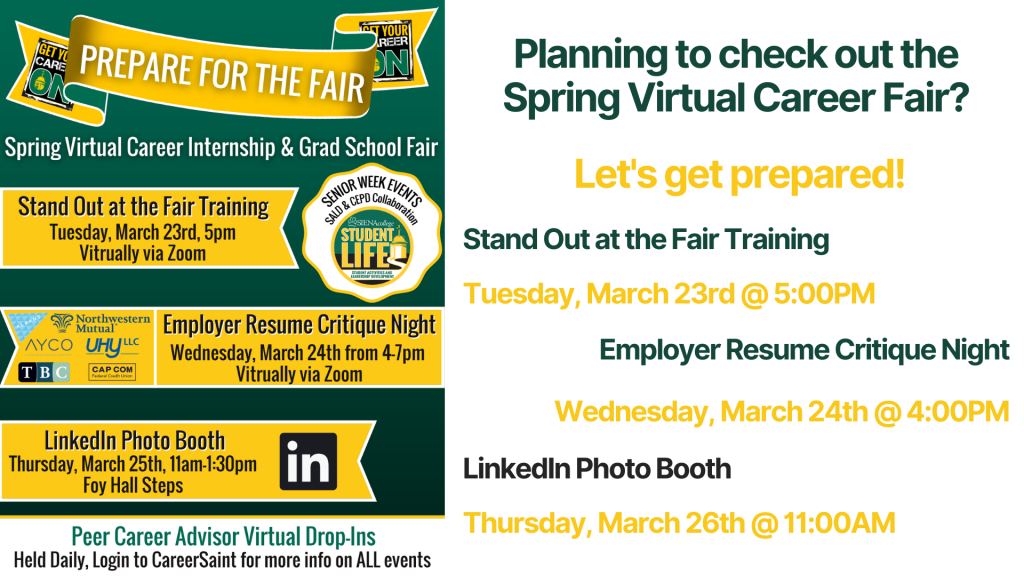
By: Kiera Mitru
Spring has sprung and along with it are budding opportunities for your future. Join the Career Education and Professional Development office at their annual Spring, the Career, Internship, and Graduate School Fair. While offered in a virtual format this year, the Fair still presents promising employer turnout and ample opportunity to make your mark!
I sat down with Ashley Dwyer, CEPD’s Assistant Director of employer relations to chat about the importance of the Career Fair and how it can prove to be beneficial for both employers and students. If you don’t know Ashley as a fellow Saint from the class of 2008, you may be more familiar with her infamous email blasts, speaking to the masses via adwyer@siena.edu, being sure to keep Siena’s student body informed on all things career preparation. During our conversation, Ashley noted that, more than anything, the Fair is the perfect opportunity to work on networking skills.
“While nobody wants to deal with networking, it’s the elephant in the room that never goes away.” Ashley shares that while networking can sometimes feel tedious, it’s crucial to “get comfortable with the uncomfortable.” After speaking with an employer’s representative, it’s a great idea to connect with them on LinkedIn and reinforce the initial conversation you have with them. In this case, it is important to reintroduce yourself and discuss how you would like the connection to benefit you. Ashley advises against using the generic “fill-in” examples provided by LinkedIn, as those are less personal. Instead, she encourages students to be specific and personable, tying in connections from the conversation you shared. An example being:
“Hello Sheila, my name is Kiera Mitru and I enjoyed having the opportunity to speak with you about Bard College’s graduate course offerings surrounding sustainability. As I look to continue my grad school research, I will be sure to reach out with any questions!”
A message like this communicates your interest in the conversation with a nod to the topics you discussed. This form of communication will also provide your new connection with insight on how you visualize your level of contact going forward.

While it may be easy to go into the Fair with low expectations, Ashley Dwyer shares that companies participate in Siena’s Career Fair specifically to hire Siena students. This is because they have done so in the past and are pleased with the products of the “Education for a Lifetime.” It is rare that a company will participate in a Career Fair if they don’t have open positions, and if they do, it’s likely that they will have positions open for the following fall or spring.
This fair is just as important for underclassmen to check out, since it’s wise to start making connections early. In this case, students can maintain their network and have a strong list of references to utilize when it comes to seeking internships. Even if you don’t hear about the position of your dreams opening up right after graduation, you enter the Fair with an open mind and leave with contacts and information that could prove to be helpful in time.

Many students know that the Fair typically leans toward having more opportunities for business majors than any other major, but this does not mean that it won’t be helpful for students of all fields of study. As an English major in her undergraduate career at Siena, Ashley Dwyer understands the flexibility of a Liberal Arts degree. She recognizes that many Liberal Arts degrees like English, philosophy, and history are ambiguous and don’t have the same linear tracks that an accounting major may have. While this sounds daunting, it can also be seen as liberating. As Liberal Arts students, we have options. Dwyer shares that “Companies want someone with strong communication, interpersonal, and analytical skills. This is what Liberal Arts majors excel in.” Additionally, experience in Liberal Arts internships and research settings is impressive in the job market. It is important to communicate the value of your experiences in and out of the classroom. For example, maintaining a personal blog online, growing a social media following, writing for a small student publication, or developing your hobby into a small business is crucial to mention in an interview. This showcases ambition and leadership which are necessary to project in a professional setting.
Since the Fair is in a virtual format this year, I would like to share some tips for those that may be a bit apprehensive about interviewing online. While the job search via Zoom may feel awkward, the following tips are sure to make your interviews successful:
- Look into the camera when you speak. This will feel more personal to the interviewer, making it seem as if you’re making direct eye contact with them while answering their questions.
- Pick a well-lit space with a professional background. The study rooms in the library are great for this. There is plenty of light, lots of quiet, and few distractions. If you book a study room for the time that you plan to attend the fair, you can give yourself the space to focus and nail your interviews!
- Since it’s likely that you’ll be speaking with a number of potential employers, the safe way to go is to avoid clothing that may be revealing. Choosing a top that you feel comfortable and confident in will translate well to the people you interview with. If you are wearing a dress shirt, the Fair is a great opportunity to break out those ties you got as a gift for some past holiday or birthday or graduation long ago. Not to mention, this will tie your outfit together and present a polished look to the employers.
- Be yourself when you meet potential employers or network connections! Your individuality is what makes you stand out, and in a virtual format it is important to foster a strong connection with the person or people you talk to. Your skills and experience are something to be proud of! In the job search, conveying confidence is about 50% of the work. If you can promote your personality in a positive way, odds are that this optimism will be contagious. You will come across as motivated and driven toward success – who wouldn’t want to work with that?
As you look forward to this Friday’s Spring Career, Internship, and Graduate School Fair, feel confident in yourself and your passions. With support from campus resources like the CEPD office, the Office of Internship Programs, the SASE office, and countless others, your unique story will lead you toward success and countless opportunities to live a life driven by the desire to never stop learning. Looking into the future calls you to stand up and stand out as you seek to forge a path for yourself. As Friday’s fair approaches, know that you are capable, accomplished, and prepared to get your career on.

